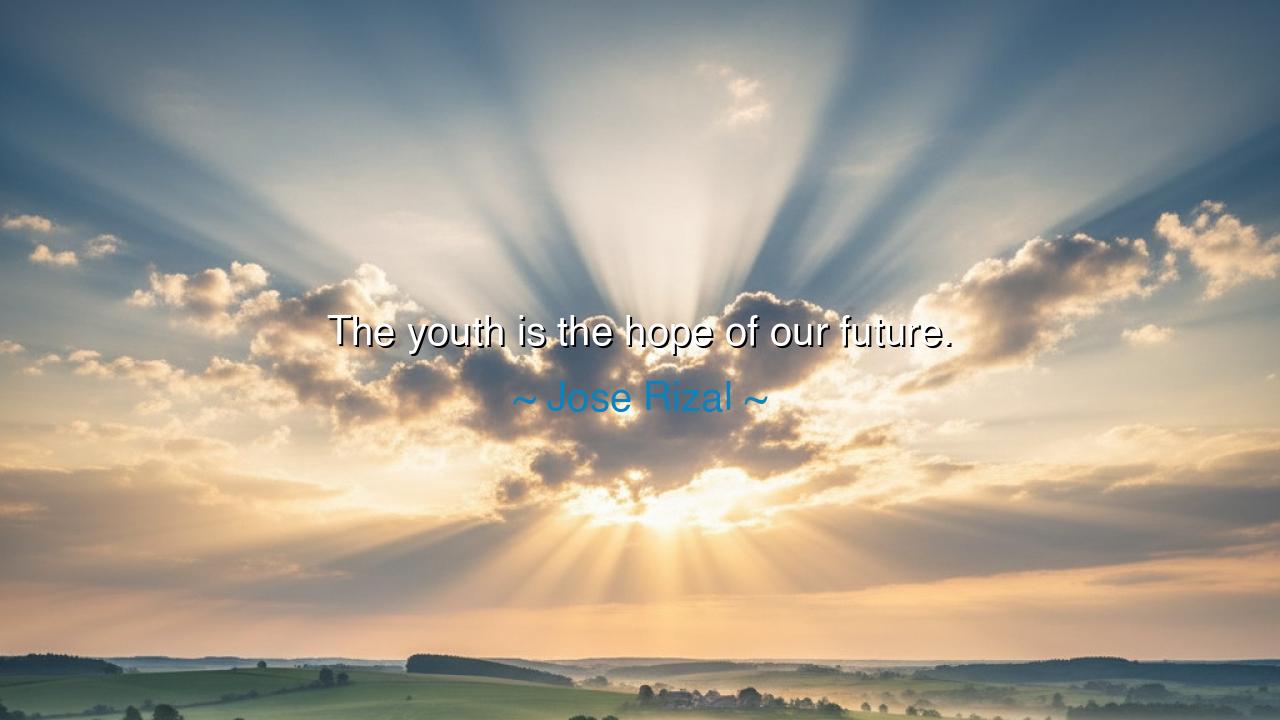
The youth is the hope of our future.






"The youth is the hope of our future." These words, spoken by the great José Rizal, are a call to recognize the power and potential that lies in the hands of the younger generations. Rizal, the national hero of the Philippines, understood that the future of a nation rests upon the hearts and minds of its youth. To him, the youth are not merely the inheritors of what has come before, but the builders of what is to come. This statement is not just a hopeful notion, but a demand for action—a reminder that the ideas, dreams, and aspirations of young people can transform society, reshaping the world in ways that older generations may never have imagined.
In the ancient world, the Greeks placed immense value on the potential of the youth to shape the future. The Spartans, known for their strength and discipline, trained their children from a young age to become warriors and leaders, understanding that the future of their civilization lay in their youth’s capacity for courage and resilience. But it was also the Athenians, with their emphasis on education, philosophy, and civic engagement, who saw that knowledge and critical thinking were the cornerstones upon which future society would stand. To the ancient Greeks, the youth were the torchbearers of their ideals, charged with carrying forward the values of justice, truth, and freedom.
Consider the life of Alexander the Great, who, though born to a powerful king, was shaped and molded by the wisdom of his youth. Under the tutelage of the great philosopher Aristotle, Alexander not only learned the art of war but also the principles of philosophy, science, and literature. His remarkable achievements were not just a result of his royal blood, but of his early education, which shaped his vision of a world united under Hellenistic ideals. Alexander's youth was the foundation upon which the future of his empire was built, showing that it is not only the strength of the body that carries a nation forward, but the strength of the mind and spirit that young people carry within them.
In the same vein, José Rizal recognized the power of the youth to revolutionize a nation. During a time of colonial oppression, Rizal saw in the younger generation a spirit of resilience and hope. He dedicated his life to education, knowing that through intellect and enlightenment, the youth would be able to challenge the injustices that had plagued his homeland. His writings, especially his novels Noli Me Tangere and El Filibusterismo, were not just critiques of the society of his time, but calls to action for the Filipino youth, urging them to rise above the oppressive forces and lead the charge for independence. Rizal understood that the youth are the shapers of a nation's future, and it is their minds and hearts that will steer the course of history.
As we look to more recent history, we can find further confirmation of Rizal's words in the stories of youth-led movements around the world. Consider the Civil Rights Movement in the United States, where young people played a pivotal role in challenging the system of racial segregation. Figures like Ruby Bridges, the young girl who integrated a school in Louisiana, and the Freedom Riders, who bravely stood against the injustice of segregation, show us how the youth’s courage and vision can reshape the world. These movements, ignited by the youth, proved that they are not mere bystanders in history—they are the agents of change, the ones who can make a future that reflects the dreams of those who came before them.
The lesson that Rizal imparts to us is one of empowerment and responsibility. The youth are not just the hope of the future—they are the creators of it. Every generation has the power to shape the world, but it is the next generation that is often best positioned to challenge old systems, question outdated ideals, and create something new. This is why it is so critical for those who are older to invest in the youth, to teach them, to guide them, and to give them the tools they need to lead. But it is equally vital for the youth to embrace their own power—to educate themselves, to speak out, and to take action toward a world that is more just, compassionate, and equitable.
So, dear listener, take this wisdom into your life. If you are young, know that you hold the future in your hands. You are not merely waiting for something to happen—you are the change that is coming. The dreams you have today are the foundations of tomorrow. If you are older, remember that you have a responsibility to guide and mentor the youth, to help them see their value and potential. Together, through education, action, and unity, we can ensure that the future is shaped by wisdom, creativity, and compassion. The youth are, indeed, the hope of the future—but they are also the architects of it.






AAdministratorAdministrator
Welcome, honored guests. Please leave a comment, we will respond soon